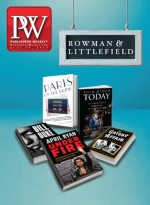In her new book, Leveraging Wikipedia: Connecting Communities of Knowledge (ALA Editions) Merrilee Proffitt, a Senior Program Officer at OCLC and author of the new book, looks at how librarians today are connecting with Wikipedia.
Can you talk a little about librarians’ attitudes toward Wikipedia and how their engagement with it has evolved?
Five or six years ago I was hearing from a lot of people who were really reluctant to engage with Wikipedia, but that’s really shifted a lot. Within the Wikimedia community, there has been a real effort to get GLAM [galleries, libraries, archives, museums] institutions more engaged, and I think that’s helped give people in our profession a little more of a guarantee of the credibility of the project.
The real barrier for most librarians is seeing how they can incorporate it in their day-to-day work, something Andrew Lee addresses in more depth in my book. Everybody knows what Wikipedia is, but few know how its constructed, for example. And if you’re a reference librarian, and people come to you with something they found through Wikipedia, having the skills to assess that is really important—for example, knowing to look at things like when the article was last updated, the quality rating, has the article been edited by a variety of people over a long period of time or is it in an early stage? Those are skills that reference librarians could and should have in their toolkits. Of course, Wikipedia is such a big project, and there are so many aspects to librarianship, [engagement] really depends on one’s position. It’s not all about editing articles; it’s about understanding the larger landscape of Wikipedia and where your form of librarianship fits into it.
Can you walk us through what goes on in an ‘edit-a-thon’?
In an edit-a-thon, you’re basically bringing experienced editors together with people who want to learn to edit, and engaging them around a theme, to add drive and focus. There’s a great chapter in the book by Sara Snyder in which she explains that the perfect edit-a-thon blends a willingness to learn with a willingness to leverage your collection and your local knowledge.
For example, I live in the Bay Area, and the most recent edit-a-thon I attended was Art+Feminism, a theme focused on closing the gender gap in articles related to art. It was held in the library of the San Francisco Museum of Art. There were probably around 60 people there, and a list on the wall of suggested articles that people could edit. I was looking to edit articles related to women involved in the Burning Man Arts Festival. Interestingly, one of the founders of Burning Man is a woman. But it’s really hard to find information about her, so I’ve been working to find a good source that can form the basis of an article on her. The New York City chapter, meanwhile, has done a series called AfroCrowd where they organize monthly edit-a-thons focused on the African diaspora and documenting people, places, organizations that are related to African diaspora.
Wikipedia obviously documents a lot of things, but it doesn’t document everything and it doesn’t document everything well. So when people have an opportunity to come together to make a positive impact and improve something, it really helps.
Can you tell us a little about the #1Lib1Ref campaign?
Sure, #1Lib1Ref is a campaign that runs for a couple of weeks every year close to the birthday of Wikipedia. It’s like a gift librarians can give to Wikipedia. When you look at Wikipedia you will see a lot of “citation needed” notes in brackets. The idea is to find one that you can address. There’s a tool called Citation Hunt that you can use, or you can just go looking for articles on your own. Every year there are libraries that have dedicated little events—like a coffee hour or a day when people will come in and out and learn a little bit about how to edit Wikipedia, add that first citation, and then get a little bit of confidence using it. I know when I’ve done it, I usually wind up doing a lot more editing than just adding citations because I will inevitably find some little nugget of information that’s begging to be added. So it’s been a really nice campaign, and it fits nicely with library skills.
What is the appeal of Wikipedia for you personally?
In my career, I’ve worked in a lot of places where there’s a hierarchy and you have to ask permission. With Wikipedia, If there is something that needs to be done, and it’s clear that it needs to be done, you just do it. And if you do it wrong, someone will come along and fix it. It’s freeing, and you can feel good about doing it. Just look at how far the Wikimedia community has taken their vision of making information free and available. It’s inspiring to see a volunteer community do so, and to be a part of it.



 Volume 265
Issue 25
06/18/2018
Volume 265
Issue 25
06/18/2018





